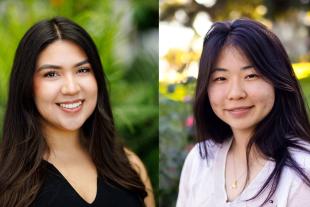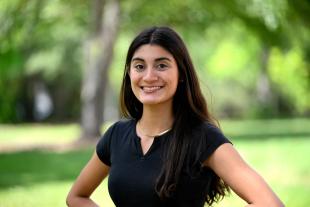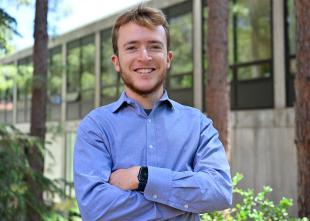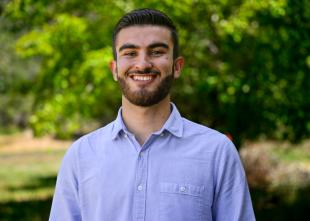Meet Some Outstanding Grads from the Class of 2021
Members of Cal Poly’s Class of 2021, who overcame one of the most challenging years in school history, are excited about commencement and beginning the next phase of their lives.
More than 5,300 graduates are eligible to take part in the virtual commencement June 11 and special in-person recognition events Saturday and Sunday, June 12 and 13. Attracted to the Learn by Doing ethos, they leave Cal Poly beaming with confidence for the future to begin careers or move on to advanced studies.
Each of this year’s graduates leaves ready to become future leaders, innovators and problem-solvers — skills earned through studies steeped in a hands-on learning environment and working shoulder-to-shoulder with classmates and faculty members.
Meet six outstanding members of the Class of 2021, individuals who overcame those and other challenges and crafted their own stories of how their university experience has prepared them for new challenges.
Gissel Neri Corcoles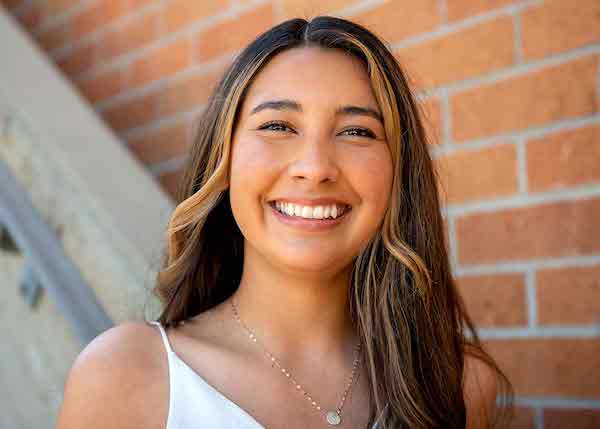
College of Agriculture, Food and Environmental Sciences
At Cal Poly, Gissel Neri Corcoles found her place in helping others find theirs.
Agriculture has played a major role in her life and her education. Active in the National FFA Organization chapter in her hometown of Greenfield, she distinguished herself with several accolades that landed her on her high school’s FFA Hall of Fame.
After high school, she said, “I wanted to attend Cal Poly, as I had heard a lot of great things about the Learn by Doing method and how that was really engraved into coursework. I instantly fell in love with the campus and the welcoming environment.”
Still, the agricultural sciences major was at first unsure of herself as she tried to settle into an institution that is larger in population than her hometown.
“Coming to college as a first-generation college student and Latina was not easy, and at times I didn’t believe in myself,” she said. “I grew up in a predominantly Hispanic community, and coming to Cal Poly was definitely a taste of culture shock. It was intimidating to be the only person of color in a classroom.
“I struggled my first quarter finding myself, where I belonged, and identifying what my support system looked like. Through my involvement in Latinos in Agriculture, I found my home away from home. The support I received from peers in the club and the advisors helped me flourish and feel proud.”
Those advisors encouraged her to step out of her comfort zones.
“I dealt with this challenge by immersing myself in DEI (diversity, equity and inclusion) efforts on campus to help those who felt like me to find their place,” she said. “I know that finding your place of belonging is crucial to being successful — and through working to create a better and more inclusive campus environment, I found my place.”
She was recognized for work over the past two academic years as the undergraduate vice president and president of the Minorities in Agriculture Natural Resources and Related Sciences (MANRRS), a national society for students of all racial and ethnic groups pursuing agricultural and related science careers. MANRRS provides networks to support professional development of minorities and is a springboard for their entry into industry and career advancement.
“In my leadership role in MANRRS, I was able to bring awareness to the importance of DEI in agriculture, and our day-to-day lives,” she said. “I am proud of being an advocate for positive change within our university.”
Neri Corcoles also was honored as the college’s 2020 Diversity, Equity and Inclusion Award recipient. She takes great pride in her efforts to address diversity issues by developing the curriculum for the Fresh Perspectives inclusive-excellence program and then training members of the Ag Council to share it with their clubs throughout the college.
Presenting the program was intimidating, she said, “but looking back, I am proud that I took the initiative to make a change on campus. Through this I found courage to speak up and use my voice to improve our campus environment.”
Neri Corcoles will join 173 ag science classmates — part of the total 956 graduate and undergraduates students from her college graduating this spring. And this fall, she’ll return to Cal Poly as a graduate student.
“I will pursue my master’s in agricultural education and a teaching credential this upcoming school year,” the 22-year-old said. “My goal is to become an agricultural educator in hopes of inspiring youth to pursue their passions without fear or doubt in themselves.”
Zane Ellis-Rector 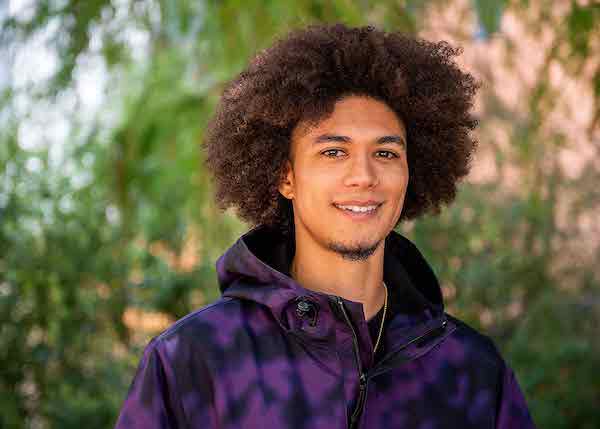
College of Architecture and Environmental Design
Like many young college students, Zane Ellis-Rector faced an existential question in his freshman year. Surveying his bright, talented and ambitious classmates, the Berkeley High School graduate wondered: Was architecture the right major for him? Was Cal Poly even the right university?
“Being the only Black man in my graduating class and seeing the stellar work my classmates produced made me feel as if I didn’t belong or was masquerading as something I wasn’t,” the 23-year-old said. “I contemplated switching majors or even schools — but quickly realized that there was absolutely nothing I could see myself studying if not architecture. I was a Cal Poly architecture student, and I set my mind to doing everything in my power to succeed.”
When he found himself struggling with that “sense of self and identity,” he reached out to classmates with similar experiences. His second year, he became more involved with Cal Poly’s Black Student Union — a cultural and social club that fosters a safe and welcoming space celebrating Black culture.
“This became a place where I could be with people who looked like me, and it served to validate my experiences at a predominantly white institution and provide a social network of fellow Black students,” said Ellis-Rector, who ultimately became the club’s president of internal affairs. “Playing on the BSU intramural soccer team, volunteering at every possible opportunity for events and attending weekly meetings kept me sane and motivated even at my lowest points.”
Living on campus also posed challenges for this only child of parents who also had no siblings.
“I have always been a relatively independent person,” he said. “The biggest adjustment for me was being in constant proximity to so many other people. Sharing a room for the first three years of college was something incredibly new, but all my roommates were nothing short of amazing and have turned into phenomenal friendships.”
The campus was also his workplace, in a variety of jobs: teacher’s assistant; student assistant for the Black Academic Excellence Center; and warehouse receiving clerk for the Cal Poly Corp., the nonprofit that provides a host of essential campus services.
Ellis-Rector takes great pride in [Trace] Design Collective, a student-run nonprofit enterprise he cofounded in 2018 to offer affordable architectural design services to San Luis Obispo County residents. Projects have included home remodels/additions, interior design and construction/design documentation.
And he is grateful for the education and skills he developed over the past five years.
“Every class I took was not only rigorous but thought-provoking and interesting,” he said. “I had some amazing professors who were not only great at their jobs but truly compassionate individuals who want to see their students succeed.”
Ellis-Rector plans to return home to Oakland, California, and take “a moment to breathe.” “I will be looking for work at an architecture firm to continue gaining experience,” he said. “Down the line, grad school is certainly a possibility.”
Ultimately, he would love to design skateparks as his vocation, combining an appreciation and love of art and design — fostered by his artist parents — and a 15-year passion for skateboarding.
“I am so proud of myself for choosing to come to San Luis Obispo, study architecture at one of the country’s premier institutions, and thrive in the process. Who knows what the future may hold, but regardless, I carry the title of Cal Poly alumnus with pride and look forward to seeing what the future holds.”
Ellis-Rector joins 433 undergraduate and graduate students who make up the College of Architecture and Environmental Design’s Class of 2021.
Javier Guerra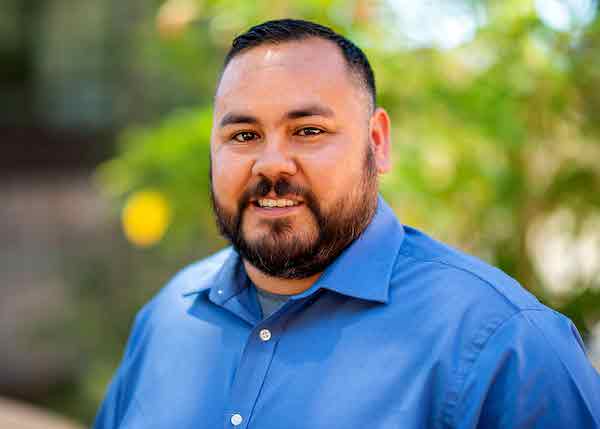
College of Engineering
Javier Guerra finished high school bound for college. Some 20 years later, after a circuitous route around the world — and, at times, under fire — he’s completing that mission a different man, in a different place.
The 37-year-old Atascadero resident will join 11 other Marine, Navy, Army an Air Force veterans in Cal Poly’s Class of 2021.
“One of the biggest challenges I had completing my degree was having to juggle many roles,” said Guerra, one of the 262 mechanical engineering undergraduate and graduate degree recipients. “I’m not only a college student. I’m also a father and husband who has responsibilities at home.
“My time in the Marine Corps gave me the discipline, drive and motivation to continue. We Marines don’t believe in quitting. When we set our sights on a goal, we achieve it and do it right.”
It’s been a long journey for Guerra, who grew up in Las Cruces, New Mexico, and had received a “full-ride scholarship” for his hometown school, New Mexico State University. Guerra speaks four languages and was considering a language program as graduation neared in 2002.
“The area I was raised wasn’t the greatest, so I knew I needed to get out of my hometown,” he said. “I decided the best way out was to join the military.”
He spent the next dozen years in uniform, including three deployments to Iraq as well as time in Japan. In 2015, Guerra was honorably discharged from the Marine Corps as a staff sergeant. He enrolled at MiraCosta College in Oceanside, California. Attracted by Cal Poly’s Learn by Doing approach, he started his junior year here in fall 2018.
He became one of the mainstays of the campus Veterans Success Center, a place where service men, women and dependents find camaraderie and assistance in accessing educational benefits, campus resources, leadership activities and easing the transition into the civilian work world. Cal Poly has 100 military veterans.
Guerra felt he stood out in his classes.
“I am a first-generation college student, a veteran and definitely one of the oldest — if not the oldest —student in most of my classes,” he said. “But I was very fortunate that other students I worked with saw me like one of them. I wasn’t seen as ‘the old guy’ who was finally getting his life together; they all saw me as another student going through the same situation they were going through.”
His senior project provided an opportunity to help a fellow veteran — beekeeper Alejandro Jauregui, who took part in four combat tours in the Middle East — perform his work despite losing his legs to an IED explosion in Afghanistan.
Jauregui’s 1,200 bees are rented out to pollinate almond crops and also produce a cash crop from 200 gallons of honey a year. But when the hives fill with honey, the bee boxes Jauregui lifts for inspection can weigh as much a sack of concrete mix.
“If you do one or two beehive boxes, it’s not a big deal,” Guerra said. “Sometimes he has to lift 100 in one day.”
Guerra’s team modified a steel dolly with a mechanical arm that clamps onto the top of a bee box. Using the dolly to actually lift the boxes relieves much of the stress on Jauregui’s back.
For Guerra, the experience “was like a blessing for me. I really like working with veterans. We have that common ground.”
Guerra’s next assignment is starting his career as a refining and midstream engineer for the Phillips 66 Co. He is among the College of Engineering’s 1,357 graduate and undergraduate degree recipients.
James Hasbany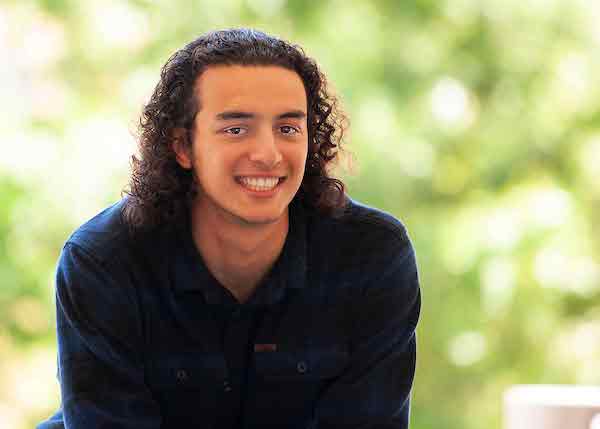
Orfalea College of Business
James Hasbany’s goal is to help develop environmental policy at the state and national levels using an economist’s tool kit.
The Morgan Hill resident who attended Bellarmine College Prep in San Jose, California, arrived at Cal Poly in fall 2017 attracted by the Economics Department’s “focus on practical, quantitative skills and methodologies, in a Learn by Doing way, in comparison to other universities’ focus on purely theoretical economics,” he said.
Coming to Cal Poly to study economics and quantitative analysis, with a minor in mathematics, he brought along an interest in teamwork, math, public speaking and video gaming, all of which played a role in his development as a scholar, researcher and organizer.
Hasbany spent several years on the Cal Poly Debate Team, representing the university at regional and national championship tournaments, advancing to the 2019 quarterfinals at the Social Justice Debates Eastern Championship, where speakers discussed the role speech codes play in undermining or furthering social justice on college campuses.
He remained active in the SLO Smash Community, a group of Nintendo software gamers, as treasurer of the group and as head tournament officer, ensuring that regular events with 100 or more competitors ran smoothly. The club became one of the most competitive college communities and established itself as part of California’s professional Smash Circuit.
He also served as vice president of the college’s Economics Society and created a weekly economics podcast and club to engage students and faculty in economic discourse that promoted critical thinking using both the Socratic method and direct engagement.
These experiences “helped me meet others who shared my interests, which has helped create friendships that will hold long after graduation,” Hasbany said.
He grew as a scholar and researcher over the past two years working with faculty on a variety of projects involving leadership positions and data collection. Projects included urban forestry and the Supplemental Nutrition Assistance Program (SNAP), or food stamps, that provides nutrition benefits to supplement the food budget of families in need so they can purchase healthy food and move towards self-sufficiency.
The latter was his senior project, “Food Stamp Enrollment and Mental Health: An Implicit Tax on the Poor,” that he and Jacqueline Doremus, an assistant professor of economics, expanded in order to submit the paper to an economic journal.
“It analyzes the mental health ramifications of food stamp enrollment,” he said. “We find that when families enroll in food stamps, they face logistical barriers navigating government systems as well as stigma, both from internal cognitive dissonance and external scorn, which ultimately worsen mental health.”
Another Doremus-led research project he assisted with examined the effects of jet lag on NBA team performance between 2014 and 2018. They found that when NBA teams travel across different time zones, “the changes in game time relative to their internal circadian rhythm affect scoring performance,” he said.
That work with faculty made his Cal Poly education for a unique experience.
“The economics faculty have single-handedly changed my life” he said. “They gave me the tools, guidance, experience — and ultimately their faith and confidence in me — to follow my dream of becoming an environmental economist. I was able to do that thanks to them.”
After graduation, the 22-year-old will first head back to school, attending UC Davis for a doctorate in agriculture and resource economics, concentrating in environmental and natural resource economics, with a focus on biodiversity conservation,” he said. “Environmental issues are incredibly important to me, and I hope to research solutions to them going forward.”
He will receive his bachelor’s degree along with 84 economics graduates, among Orfalea College of Business’ total 941 undergraduate and master’s degree recipients.
Ashlee Hernandez
College of Science and Mathematics
Ashlee Hernandez and her 5-year-old son, Noah, are both celebrating commencement this spring.
“He is graduating preschool as I graduate from my master’s program, so we have been on this journey together,” said Hernandez, a 6-year Templeton resident who earned her bachelor’s degree with honors in sociology from Cal Poly in 2019. “There is nothing better than knowing I earned my master’s not only for my son but with my son. He attended the ASI Children’s Center for most of my time at Cal Poly, so we were able to commute to school together every morning.”
Hernandez has now earned a master’s in higher education counseling and student affairs, a program that prepares students for careers as counselors and student affairs professionals in a variety of higher education and nonprofit settings.
Being a married and often harried student, mom and wife led Hernandez to advocate for some needed campus changes.
“The biggest challenge was realizing that institutions of higher ed are not built with students like me in mind,” she said, “whether it was having to figure out how I would walk my stroller down a big flight of stairs or not having the opportunity to make up missed classwork when I had to pick up my sick child from the ASI Children’s Center.”
Her experience inspired her to push for organizational changes with committed and supportive campus partners.
Her advisor Tina Cheuk, an assistant professor of elementary science education, called Hernandez’s drive, motivation and accomplishments inspiring.
“As a founder and coordinator of Cal Poly’s Students with Dependents Initiative, she led a comprehensive needs-assessment on behalf of student parents across our six colleges,” Cheuk said. “She successfully advanced policies through both the Associated Students Inc. and the faculty Academic Senate in amending a more equitable attendance policy for students with dependents, secured institutional grant funding to research ways institutional culture has supported and hindered belongingness and academic success for non-traditional students, and has built a robust and active students with dependents community — all while pursuing her undergraduate and now a master’s degree at Cal Poly.”
Hernandez was a successful 4.0 student and “emerging scholar” for future research in the emerging field of student parents and their children. She was named a 2020-21 California State University Sally Casanova Scholar by the CSU Chancellor’s Office. These scholars, who receive a $3,000 stipend and a fully funded summer research experience at a major research university, have unique opportunities to explore and prepare for their doctoral programs.
Meanwhile, she started a new position in March working virtually as the project manager for Fresno County Health Improvement Partnership. “I oversee a $2.7 million grant used to implement a seamless screening, referral and response process to support at-risk families experiencing health disparities,” she said.
In addition, she received the College of Science and Mathematics’ Outstanding Graduate Student award for the School of Education (after a unanimous nomination by her program classmates and faculty), the school’s Outstanding Citizenship Award, as well as the President’s Diversity Award.
“Cal Poly has impacted my life in so many ways I cannot even count,” she said. “I have created lifelong friendships through my cohort, graduate assistantships and the Educational Opportunity Program. I have also learned how to navigate complex organizations because of the more ‘organic education’ I have received from mentors who always made space to ask questions and seek new opportunities.”
Hernandez is one of 60 School of Education graduates, among the College of Science and Mathematics’ total 706 graduate and undergraduate degree recipients.
Victoria Siaumau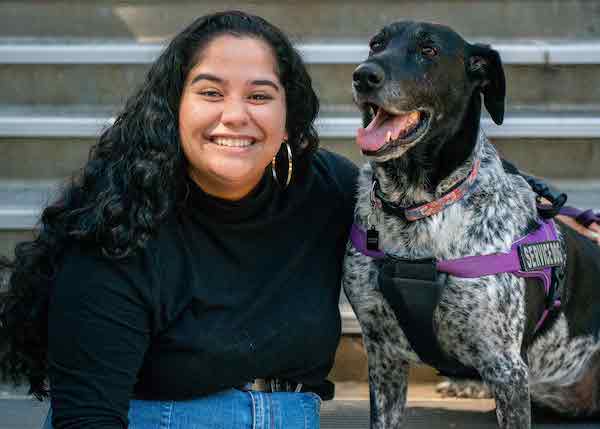
College of Liberal Arts
As a member of her college’s Underrepresented Students Network, Victoria Siaumau met informally with other students to listen and offer advice about where to find campus support and resources.
The network is a casual place to talk with peers who can identify with the experiences of other underrepresented students.
To new students, she offered more than a sympathetic ear and was more direct in her mentoring: “Ask professors about their research and their education path,” the Long Beach, California, resident would suggest. “Many professors have been kind enough to mentor me and help me figure out my career path as my interests have changed.”
Thanks to her own mentors, the first-generation college student’s initial career goals “were radically transformed.”
“I came into Cal Poly as a biochemistry major with the intention of going to medical school,” the 21-year-old said. “Because Cal Poly allows undergrads to be so heavily involved with research and because I had the amazing support of the Ethnic Studies Department, I fell in love with research. I’m so grateful for my academic and career change, because this work truly fulfills me.”
Now, she will graduate with dual bachelor’s degrees in child development and ethnic studies and a minor in psychology.
Cal Poly’s Ethnic Studies uses inter- and multidisciplinary approaches to understand and transform enactments of power where race and ethnicity remain central, Siaumau said.
Siaumau arrived in San Luis Obispo as a freshman in fall 2017 after graduating from her ethnically diverse high school, the California Academy of Mathematics and Science in Carson.
“Cal Poly has made me grow as a person in ways that I was not expecting,” she said. “Being a woman of color coming from somewhere as diverse as Long Beach, Cal Poly was a big cultural shock for me. However, this environment did force me to grow and become a more-involved activist and be more involved in diversity, equity and inclusion work.”
She was active on campus, involved with several research projects, campus jobs, participated in student protests, as well as involvement in Cal Poly Dance Marathon, the student-run club that hosts a 12-hour dance each spring to raise money for patients and their families at Cottage Children’s Medical Center in Santa Barbara, California.
As her interest in research projects developed, she said one of her biggest accomplishments was having two abstracts accepted to a conference — “one of them as the lead author.”
She will look back fondly at her development as an activist and scholar at Cal Poly.
“I will most remember all the wonderful professors from both the Child Development and Ethnic Studies departments who have taken the time to mentor me and help me grow as a researcher and as a person,” she said.
Siaumau is among 952 students receiving undergraduate and graduate degrees from the College of Liberal Arts. She plans to take a break from school to gain more research experience “and further focus on what my research interests are before applying to doctorate programs.”
“My career goal is to be a university professor doing research,” she said. “I want to be able to study the science, technology, engineering and mathematics (STEM) field through an ethnic studies lens.”

